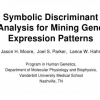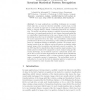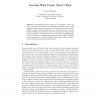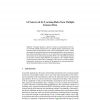113
click to vote
ECML
2001
Springer
15 years 6 months ago
2001
Springer
Abstract. This paper presents a simple unsupervised learning algorithm for recognizing synonyms, based on statistical data acquired by querying a Web search engine. The algorithm, ...
ECML
2001
Springer
15 years 6 months ago
2001
Springer
When correct priors are known, Bayesian algorithms give optimal decisions, and accurate confidence values for predictions can be obtained. If the prior is incorrect however, these...
119
click to vote
ECML
2001
Springer
15 years 6 months ago
2001
Springer
In many applications, modelling techniques are necessary which take into account the inherent variability of given data. In this paper, we present an approach to model class speci�...
ECML
2001
Springer
15 years 6 months ago
2001
Springer
Solomonoff’s uncomputable universal prediction scheme ξ allows to predict the next
ECML
2001
Springer
15 years 6 months ago
2001
Springer
108
click to vote
ECML
2001
Springer
15 years 6 months ago
2001
Springer
We present a powerful meta-clustering technique called Iterative Double Clustering (IDC). The IDC method is a natural extension of the recent Double Clustering (DC) method of Slon...
ECML
2001
Springer
15 years 6 months ago
2001
Springer
Modern agent and mediator systems communicate to a multitude of Web information providers to better satisfy user requests. They use wrappers to extract relevant information from HT...
108
click to vote
ECML
2001
Springer
15 years 6 months ago
2001
Springer
Abstract. This paper proposes a generic extension to propositional rule learners to handle multiple-instance data. In a multiple-instance representation, each learning example is r...
COLT
2001
Springer
15 years 6 months ago
2001
Springer




